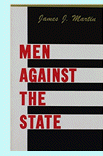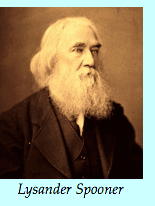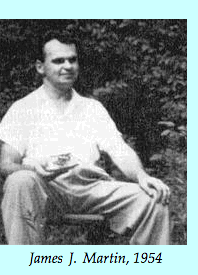 Introduction James J. Martin (Larkspur, Colorado: Pine Tree Press, 1966) |
| Downloadable PDF version
Since late Neolithic times, men in their political capacity have lived almost exclusively by myths. And these political myths have continued to evolve, proliferate, and grow more complex and intricate, even though there has been a steady replacement of one by another, over the centuries. A series of entirely theoretical constructs, sometimes mystical, usually deductive and speculative, they work to explain the status and relationships in the community since it became discernibly organized, politically. But in essence these constructs are all alike in that with varying degrees of persuasiveness they attempt to examine the origins of the State with little or no attention to the historic record, and then try to justify and fortify it in the face of criticism or objection.In the long millennia during which theological authorizations of one kind or another were principally employed to sanctify the State and to promote its safety and continuity, we know very little of the critics and their products. Threats of divine retaliation by the gods upon any so sinful as to question the validity of the State may have been sufficient to inhibit the crime of deviationism. On the other hand, perhaps many ages may have had a formidable roster of adversaries of the State, but theirs must apparently have been largely an oral tradition, and has been lost to posterity with hardly a trace. A scrap or two have come down to us from the Orient, but ancient literary survivals are essential a Statist apologia. Undoubtedly the largest part of such criticisms may have subjectively denounced the more obvious vulnerabilities of the institution, particularly its capacity for promoting institutionalized robbery, murder, injustice, and tyranny. Traces of such protest are discernible in the traditions of many peoples. But the unvarying, wearisome replacement of one State by another for thousands of years reveals the depth of the fixation humankind has had concerning it, in part testifying, as Ludwig Gumplowicz and Franz Oppenheimer and others have observed, to the long-standing desire to make a living without working, a stage which has been tied to the evolution of productive processes to a point where a surplus existed beyond the needs of the producer. (The steady increase in the numbers who batten upon the substance of the productive community in the name of the State testifies in turn not to a mellowing expansiveness, a generous enlargement of the preying nomad band, as Oppenheimer would have it, but to the prodigious increase in production totals beyond the subsistence or survival demands of the former.) Oppenheimer described the United States of America a half century ago (in The State [Indianapolis: Bobbs-Merrill, 1914], p. 17) as “among the most powerful State-formations in all history.” Its prodigious growth since that time would surely have prompted him to elevate it to first place and perhaps decades ago had he lived to make such observations. There is no apparent logic or law regulating the age-old conflict between the individual and the collectivity, between the State and the idea or the reality of the voluntary social system. However, in America, the site of the evolution of the mightiest State of all time, there has been an inverse ratio between its growth and the production of native anti-Statism. Vasili Klyuchevsky, the giant of historical scholarship in the last century of Czarist Russia, put it best: “The State swells up, the people diminish.” Part of the reason for this has been the much more opaque and intangible nature of this adversary. No stylized, symbolic agents, such as perhaps a traditional oligarchical priesthood of antiquity or a divine-right monarch, have existed here to provide a convenient target for word or deed. The tying of political tenure to astronomy instead of to dynasty has removed the possibility of a long-enduring personal symbol from the scene. And a massive obstacle has been created as a result of the homogenization growing out of mass voting, mass taxpaying, mass gun-bearing, and mass dispersal of the tidbits bestowed by the State; a vast, gray, shapeless enterprise has come into being, with which it has been difficult to come to grips, as in the manner of classical conflicts with the State. One of the important consequences of all this has been a difference in the structure and strategy of State apologetics in America. There has been a marked diminution over the years in the invocation of the Deity as responsible for its installation and overall direction and protection. Divine-right and related theories have never enjoyed a vogue at all. The American genius has been concentrated in perfecting vague and generalized verbiage, elusive, imprecise terminology which often sets the line for seemingly interminable battlegrounds of conflicting interpretations. Expressions such as “general welfare,” “public good,” “social contract,” “general will,” and many others, come to mind.  Of course, the crowning achievement in the American experience was the production of the Constitution, the ultimate verbal bastion on which is perched the American State. Constitution-worship is our most extended public political ritual, frequently supervised as often by mountebanks as by the sincere. This is an unusual enterprise in world history, in view of the casual attitude toward such developments in most places and at most times. In point of service, it is easily the oldest such political document in history, which adds much to the awe and veneration in which it is held. For though we have had over a century of native critics and opponents of our State, from [Josiah] Warren, Thoreau, and [Benjamin] Tucker down to Albert Jay Nock [also here] and Frank Chodorov, the Constitution has largely been exempted or neglected in the unfolding of this critical tradition. In America, we see, therefore, a different basis for the defense of the State. Lacking dynastic families, entrenched aristocracies, nobilities, royalties, and other ostensible residuaries of State power and beneficiaries of State emoluments, both the attack and the defense have moved to the abstract sector. For sure, in the final analysis, the State must be viewed as certain people. But Marx’s definition of the State as the executive committee of the ruling class means little in an American context. If one can say that such an entity has ever existed here, its composition has been so mixed and so varying and its tenure so transitory, that for specific purposes such a description is almost useless. No sustained, unbroken line of material profiteers from our State can be established. The bewildering turnover of elected personnel and the multiplicity of their fortunes virtually eliminate such temporary wielders of power from qualifying as reliable custodians of the State. This has been dramatized many times by the dispossessed from office complaining bitterly and vehemently over their unhappy treatment by the State, in their turn. (One need not mention the electrifying phenomenon of the last fifty years, namely the growth of administrative government, with increasingly larger amounts of power and discretion in the hands of persons who have not even been elected to anything, and who often stand at the elbow of the familiar “responsible” public figures and who are more often than not the real authors of the policies and programs for which the latter are credited or blamed as political fortunes would have it.) Breathtaking boldnessConsequently, in view of the evanescent nature of power tenure in this country, the frequent unhorsing of the holders and exercisers of State power is looked upon with equanimity and not considered a threat in any way to the State. It is the assault upon the abstract and verbal underpinnings of this institution which draws blood, so to speak. If one can consider all the participants in the struggle to control and use the State as those engaged in a game (the book by Morgenstern and Neumann on the theory of games, in which war politics are examined in this context, deserves more study),[1] then those who seek to destroy the abstract-verbal justification for such “play” are endangering the future course of all the players by riddling their rule books, which describe how such play is to be conducted while giving it a raison d’être besides. Those who attack the rationale of the game, and not the players, are the most formidable adversaries.  It is in the light of this that those who have the temerity to collide head-on with the Constitution and challenge its validity in toto stand out in such sharp outline and radiate a quality of uniqueness in the American anti-State library. And at the head of this category stands Lysander Spooner (1808–1887), whose major work in this offensive, No Treason: The Constitution of No Authority, is reproduced below from the original edition, written in 1869 and published in Boston in 1870. It is the last of a series bearing the identical main title which were to have been six in number, although this one, numbered the sixth, is actually only the third. (No Treason Nos. 3, 4, and 5 never appeared, for reasons never explained.) Bur in view of the scope of this work, it does not seem that anything pertinent was left unsaid, making necessary any further elaboration. Spooner strips away the support from any and all who conjure up one or another persuasive explanation of the Constitution as a contract, or as an agent facilitating a contract theory of government. A practicing jurist all his adult life, Spooner puts the Constitution to the test of contracts “on general principles of law and reason,” such as prevailed in public affairs and in the market place where he worked with people from day to day, and concludes that it does not meet any of the basic criteria for contracts at all, and was not valid or binding on anyone. The sort of mystical osmosis, akin to telepathy, perhaps, by which Americans were supposed to have contracted with one or another to function under the document of the launching of the post–Revolutionary War American State, evaporates in Spooner’s path as he assembles his argument, line by line, in nineteen carefully reasoned sections. Spooner does not find that the Constitution “says” anything, because it cannot talk. But he does see it as a device through which judges talk, explaining what it “said” to those who live under it. Since not even its creators signed it, the Constitution was not even binding on them, Spooner argued. (The appearance of printings of the Constitution in modern times which bear signatures of the drafters of the document does not affect Spooner’s point, which remains unaltered; the intent of this latter-day device is not discernible, but can be interpreted to be little more than an annotation and not an attempt to assert that there is a contractual connotation here, as in the case of the signatures gracing the Declaration of Independence.) And as for later times, there was no evidence that it had any binding quality upon their posterity, while all who acted under it were anonymous agents of concealed persons, who were engaged in inflicting the will of these persons upon others in an invasive manner. He went on with ingenious demolition of the arguments that voting or tax-paying were evidence of voluntary submission to those who ruled in the name of the Constitution, and challenged any office-holder or wielder of power who might claim accurately and precisely to identify those in whose name he functioned, and with whose assent he acted to make their will prevail, to do so. There is much internal evidence that Spooner believed the Constitution had been put to the supreme test by Secession and the ensuing Civil War, barely four years ended when he wrote No Treason, and that the document was a proven failure if it purported to be a voluntary compact entered into by all for the object of promoting various mutual benefits and comforts. The mere fact that so many lives lost and so much violence and blood had been necessary, for those who wanted the Constitution, to make it prevail over those who did not want it, was sufficient evidence to him that there was no difference between the American State experiment and that of all those before it which streamed away into the past. The party with the most men and guns had prevailed, and it angered and incensed him to hear political thimbleriggers bray of having “saved the country” and “preserved our glorious Union,” while “maintaining the national honor.” Spooner was not trying to sympathize with the Southern cause, though he neglected to point out that the defeated Confederacy was no less State-minded than the Northern “Union,” that it had preceded the period of hostilities with Constitution-making on its own account. His effort instead was devoted to revealing how far removed from a “government by consent” or a “voluntary union of free men” the actual situation really was. Spooner disparaged the theory that the center of the contest concerned the institution of slavery, and advanced an economic interpretation of the war in harmony with others which have appeared since, propounded by critics of the State and others not so disposed, alike. Says Spooner in conclusion, speaking of the Constitution, “This much is certain — that it has either authorized such a government as we have had, or has been powerless to prevent it. In either case, it is unfit to exist.” For sheer audacity and breath-taking boldness, No Treason remains unmatched. One cannot call to mind anything to compare with it. In order to justify the continuance of the Constitution as the foundation stone of hte American State, one must seek other entrenched positions from which to make the defense than from that of any school of theoretical contractualism, after encountering Spooner. No Treason presumes a bit more than minimum acquaintance with political and legal theory and practice, and the semantics of Statism, on the part of its readers. But one is unlikely to encounter another exercise in thinking which exceeds it in providing a more brilliant insight into the mystical speculative presumptions of the apologists for constitutionally-based Statism whose ideological roots are lodged in eighteenth century |
| James J. Martin was perhaps “the most influential libertarian book publisher since Benjamin Tucker.” Read Jeff Riggenbach’s biographical essay about him. • A few of his books exist in PDF form on the Mises Institute’s James J. Martin page. • A partial listing of his articles for the Journal for Historical Review is available here. • Also online is a lengthy interview that originally appeared in Reason magazine. And his essay “A Beginner’s Manual for Apprentice Book Burners” is online. |
| Thornwalker main pageNNNNRecoveries contents
E-mail Thornwalker at neff@thornwalker.com. Copyright © 20016–2019 Ronald N. Neff, d/b/a Thornwalker.com Thornwalker.com is hosted by pair Networks. |
